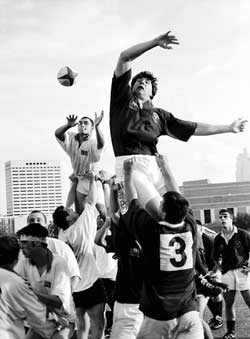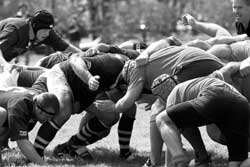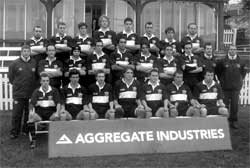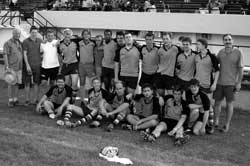|
Rugby

by Thomas Murphy (UK)
The game of rugby came into being in 1823 during a football match when William Webb-Ellis, “with a fine disregard1 for the rules as played in his time, first took the ball in his arms and ran with it.” This occurred at Rugby School, an English public school, from which the name of the game is derived2. The Rugby World Cup trophy is named “Webb-Ellis” in his honour. The first international game was played between England and Scotland in Edinburgh on March 27th 1871.
Nowadays, rugby is played in over 100 countries and 6 continents world wide. In many countries, such as Russia, the game is slowly growing more and more popular. Rugby has a justifiable3 reputation as an extremely social game with both sets of players getting together after the match to have a drink (usually beer) and chat about the match. This happens despite the extremely physical nature of the contest on the pitch because there is a sense that any differences between the players should be settled on the pitch and everything should be forgotten about afterwards. Though rugby is deemed4 by some people to be a violent5 game, and to a certain extent6 it deserves7 this reputation as there are often punches8 thrown, it maintains the image of a “game for hooligans played by gentlemen” while football, in contrast, is “a game for gentlemen played by hooligans.”
 So how is rugby played? Each team consists of 15 players, eight ‘forwards’ and seven ‘backs’, traditionally the forwards are physically bigger and stronger whilst the backs are faster and more skilful. This division partly explains some of the charm of rugby: it is a game for all people of different shapes and sizes. Whether you are short, tall, big, small, fast or slow; there is a most likely a place where you could play in the team. In many amateur9 sides10 there are people of all shapes and sizes who come up against one another but despite this, serious injuries11 are still relatively12 rare. However the arrival of professionalism in 1995 (previously rugby was an amateur game) and the subsequent13 increase of funds meant that rugby players became full-time14 professionals who are now entirely focused on the game. In turn, this led to the difference between the forwards and the backs being narrowed15 with both sets of players becoming more athletic, stronger and faster. Take the England team for example: players range in height from 175 cm to over two metres and weigh between 75 and 120 kilos.
So how is rugby played? Each team consists of 15 players, eight ‘forwards’ and seven ‘backs’, traditionally the forwards are physically bigger and stronger whilst the backs are faster and more skilful. This division partly explains some of the charm of rugby: it is a game for all people of different shapes and sizes. Whether you are short, tall, big, small, fast or slow; there is a most likely a place where you could play in the team. In many amateur9 sides10 there are people of all shapes and sizes who come up against one another but despite this, serious injuries11 are still relatively12 rare. However the arrival of professionalism in 1995 (previously rugby was an amateur game) and the subsequent13 increase of funds meant that rugby players became full-time14 professionals who are now entirely focused on the game. In turn, this led to the difference between the forwards and the backs being narrowed15 with both sets of players becoming more athletic, stronger and faster. Take the England team for example: players range in height from 175 cm to over two metres and weigh between 75 and 120 kilos.
The aim of the game is very simple — use the ball to score more points than the other team. You can run with the ball, kick it and pass it, but passing forwards is not allowed. Rugby union is a contact sport, so you can tackle16 an opponent in order to get the ball, however tackling above the shoulders is against the rules. There is a referee, aided by two touch judges (one on each side of the pitch), to decide how the rules should be applied during a game.
There are several ways to score points:
- A try – five points are awarded for touching the ball down in your opponent’s goal area;
- A conversion – two points are added for a successful kick through the goalposts17 after a try;
- A goal kick – three points are awarded for a penalty kick or drop18 goal through the posts.

An example of a scrum
A game of rugby union has two periods of 40 minutes each. Between the two halves, there is a maximum 10-minute interval, after which both teams change ends. Before the start of the match, the referee tosses a coin19 to decide which team will kick off20 the match. The captain of the team that wins the toss gets to decide which end he wants to attack first, or whether his side or the opposition will kick off. The game is started by one team kicking the ball to the opposition from the middle of the halfway line. Like American Football, Rugby union is played with an oval-shaped ball. All balls must be between 28cm and 30cm in length, most full-size balls weigh between 380 and 440 grammes.

The Oxford Colleges XV, 2004.
Some of the strangest features of rugby are the different ways of restarting a match, these are either called ‘lineouts’ or ‘scrums’. The lineout is the equivalent of a ‘throw-in’ in football but involves the two sets of ‘forwards’, (the tallest members of the team) who line up opposite one another and jump to compete for the ball which is thrown down the middle. In order to reach as high as possible players are usually lifted into the air to catch the ball. A ‘scrum’ occurs when a mistake is made, for example when the ball is dropped, and involves the two sets of ‘forwards’ pushing against each other in order to drive the other team off the ball which is on the floor in the middle. When the ball gets to the back of the scrum it may be taken out and passed to the ‘backs’ who then either run with the ball to try and score or kick the ball in order to gain territory. The basics of the game are simple but there a many other rules which often make rugby seem complicated to a newcomer. However, with time all of the nuances of the game become clear and you can fully enjoy the game of rugby in all of its glory!

anchester Grammar School Old Boys’ Team 2004.
There is a World Cup every four years and England are the current holders21, having won the competition in 2003. Currently the strongest team in the world are New Zealand; whose ‘All Blacks’* are favourites to win the World Cup in 2007. England will also be contenders along with France, South Africa and Australia.
I hope that you have been inspired to take more of an interest in rugby by this article. Do not be fooled into thinking that it is merely a game for thugs22, there is a high level of skill required as well as strength and rugby is rapidly gaining more followers amongst women too, so there really is not excuse for everyone not to get involved!
* The name given to the New Zealand team, as their kit is totally black.
1 disregard – неуважение, пренебрежение
2 derive – происходить
3 justifiable – законный
4 deem – полагать
5 violent – связанный с насилием
6 to a certain extent – в известной степени
7 deserve – заслуживать
8 punch – удар кулаком
9 amateur – любительский
10 side – команда (как одна из сторон спортивного состязания)
11 injury – повреждение, рана
12 relatively – относительно
13 subsequent – последующий
14 full-time – (зд.) занятый полный рабочий день
15 to narrow – сокращать, суживать
16 tackle – (спорт.) блокировать захватом; сбивать игрока
17 goalpost – стойка ворот
18 drop – (зд.) удар с лета (в регби)
19 toss a coin – бросать монету
20 kick off – вводить мяч в игру ударом с центра; начинать (матч)
21 holder – обладатель приза
22 thug – головорез
Читать еще в этой рубрике:
Читать еще в этом номере:
|
|











